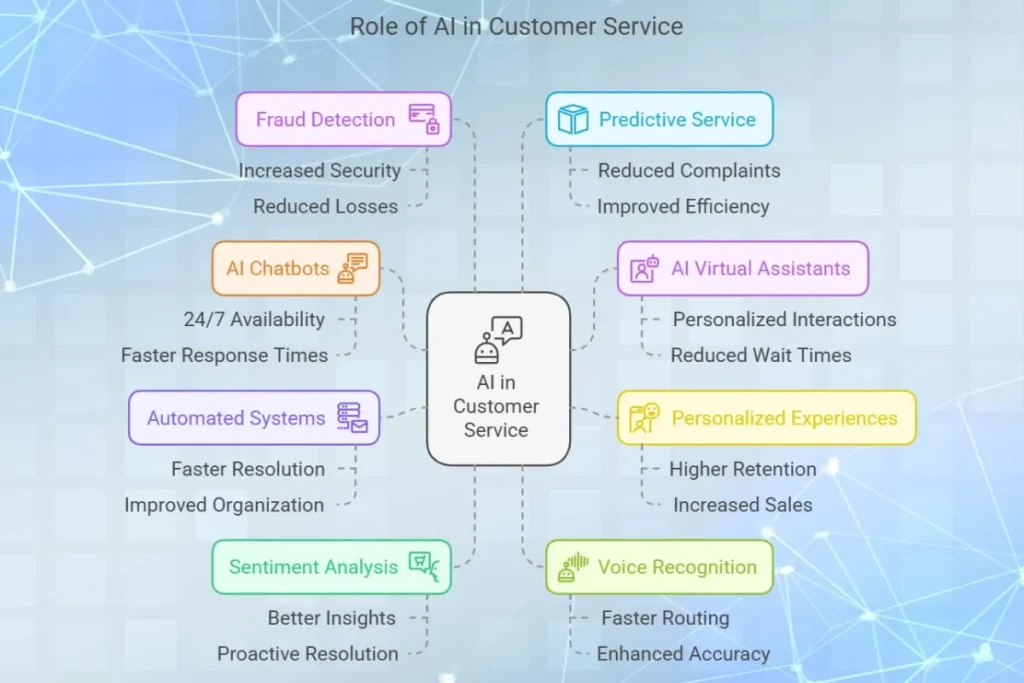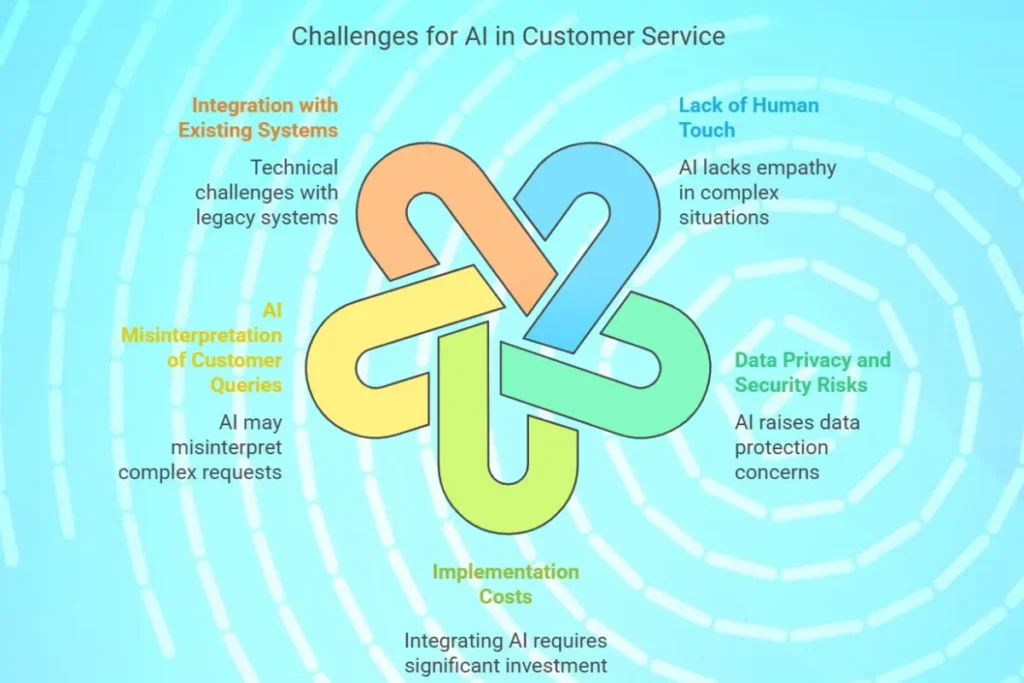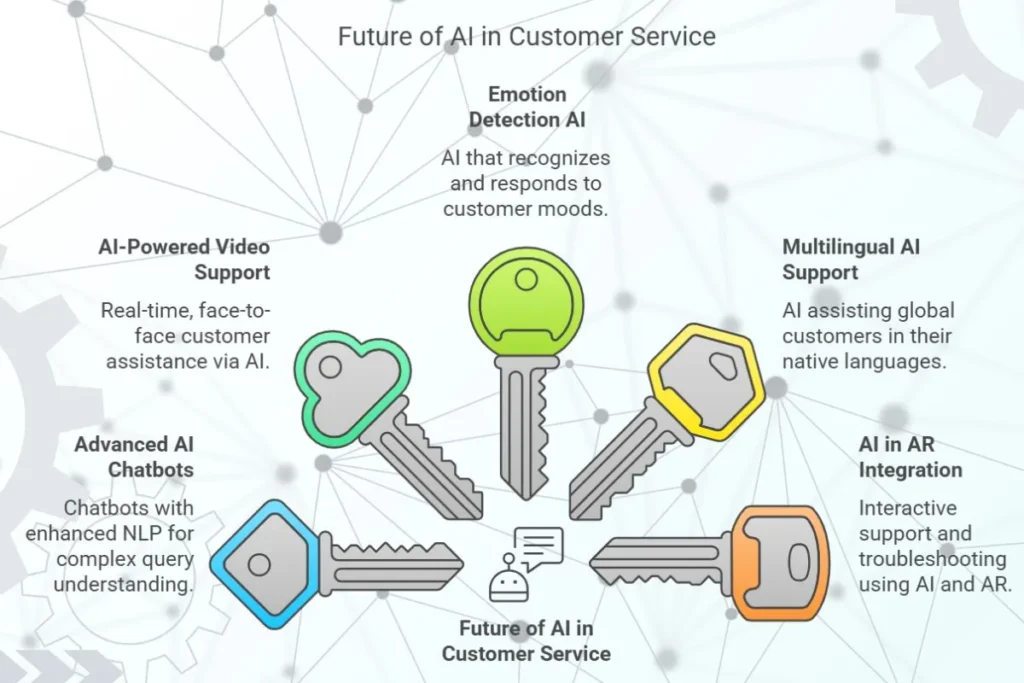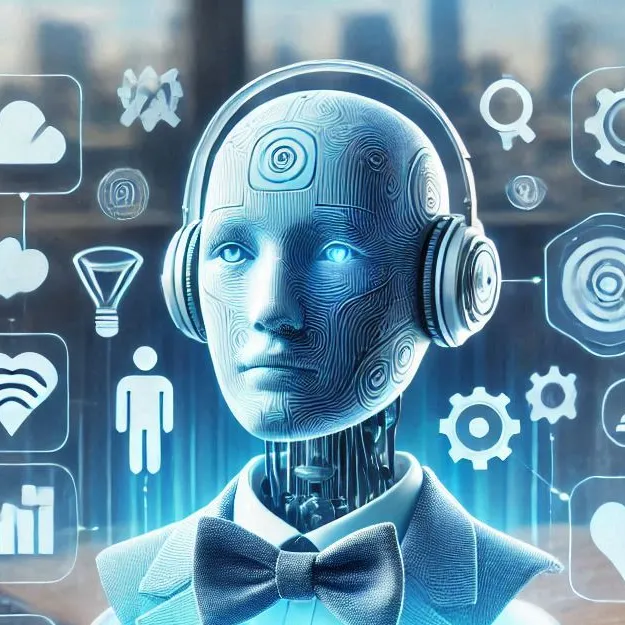Artificial intelligence (AI) has improved the customer service by increasing efficiency, reducing response times and enhancing customer satisfaction. Businesses use AI powered tools to automate support, provide personalized assistance and optimize customer interactions. AI helps companies to handle large volumes of customer inquiries and also maintains high quality services.
In this blog article we shall study how does artificial intelligence impact customer service? The effect of AI on customer service and use of AI in customer experience.
The Role of AI in Customer Service
AI helps businesses to deliver better customer service by handling inquiries, analyzing customer behavior and offering personalized solutions. Here are key ways AI is making an impact:
1. AI Chatbots for Instant Support
AI chatbots provide instant responses to customer queries. They handle frequently asked questions, guide users through processes and solve common issues without human intervention.
Benefits:
- 24/7 availability
- Faster response times
- Reduced workload for human agents
- Consistent and accurate responses
An e-commerce company uses an AI chatbot to help customers to track orders, process returns and find products. The chatbot can handle thousands of inquiries at once, which improves efficiency.
2. AI Powered Virtual Assistants
AI virtual assistants understand natural language and provide human like conversations. They help customers with troubleshooting, booking services and making recommendations.
Benefits:
- More personalized interactions
- Reduced wait times
- Improved customer engagement
- Seamless integration with mobile apps and websites
A travel agency’s virtual assistant helps customers to book flights, suggest destinations and provide real time travel updates. AI ensures responses are accurate and context aware.
3. AI for Personalized Customer Experiences
AI analyzes customer data to offer personalized experiences. Businesses use AI driven recommendations to improve user satisfaction and increase conversions.
Benefits:
- Higher customer retention
- Increased sales and conversions
- Enhanced customer loyalty
- Improved customer feelings
A streaming service uses AI to recommend movies based on viewing history and preferences. This keeps users engaged and increases watch time.
4. Automated Email and Ticketing Systems
AI automates email responses and customer service ticketing, categorizing and prioritizing issues for faster resolution.
Benefits:
- Faster issue resolution
- Improved organization of customer requests
- Reduced human intervention in repetitive tasks
- Increased efficiency in managing customer inquiries
A software company uses AI to sort customer support tickets based on urgency and direct them to the right teams. This ensures high priority issues get resolved quickly.
5. AI for Sentiment Analysis
AI powered sentiment analysis tools analyze customer feedback, social media posts and reviews to understand customer emotions and improve service quality.
Benefits:
- Better customer feelings
- Proactive issue resolution
- Improved brand reputation
- Enhanced ability to check customer pain points
A telecommunications company uses AI to analyze customer complaints on social media and address concerns quickly. AI helps predict potential PR issues before they become problematic.
6. Voice Recognition and AI Call Centers
AI driven voice recognition technology improves call center efficiency by understanding customer requests and directing them to the right support agents.
Benefits:
- Faster call routing
- Reduced call handling times
- Enhanced voice interaction accuracy
- Increased customer satisfaction
A bank uses AI system to recognize customer voices and verifies identities before connecting them to the right department. This reduces wait times and improves security.
7. AI for Fraud Detection in Customer Service
AI detects fraudulent activities by analyzing patterns in customer interactions and transactions.
Benefits:
- Increased security
- Reduced financial losses
- Improved customer trust
- Faster fraud detection and prevention
A financial institution uses AI to detect unusual account activity and alert customers about potential fraud. AI helps to stop fraudulent transactions in real time.
8. AI for Predictive Customer Service
AI analyzes past customer interactions to predict future issues and provide proactive solutions.
Benefits:
- Reduced customer complaints
- Faster resolution of common problems
- Increased customer satisfaction
- Improved operational efficiency
An internet service provider uses AI to detect network issues before they affect users. The system automatically notifies customers and suggests troubleshooting steps.

Challenges of Artificial Intelligence in Customer Service
Although AI improves customer service, businesses face challenges when implementing AI solutions.
1. Lack of Human Touch
AI chatbots and virtual assistants may lack empathy, which makes it difficult to handle complex or sensitive issues.
2. Data Privacy and Security Risks
AI relies on customer data, which raises concerns about privacy and data protection. Businesses must ensure compliance with regulations such as GDPR and CCPA.
3. Implementation Costs
Integrating AI solutions requires investment in technology and training. Smaller businesses may not afford advanced AI systems.
4. AI Misinterpretation of Customer Queries
AI may misunderstand complex requests, which leads to incorrect responses. Businesses must continuously improve AI models to enhance accuracy.
5. Integration with Existing Systems
Companies may face technical challenges when integrating AI with legacy customer service platforms.

The Future of AI in Customer Service
AI will continue to evolve, and bring new innovations in customer service. Following are some Future trends:
- More advanced AI chatbots with better natural language processing (NLP) to understand complex queries
- AI powered video customer support for real time assistance with face to face interaction
- Emotion detection AI to recognize customer moods and adjust responses accordingly
- AI driven multilingual support to assist global customers in their native languages
- AI powered automation in customer service analytics for deeper information into customer behavior
- Integration of AI with augmented reality (AR) for interactive support and troubleshooting
Businesses that invest in AI will improve customer service quality and enhance customer satisfaction. AI driven strategies will help companies provide faster, smarter and more personalized service experiences.

Conclusion
Artificial Intelligence has made revolution in customer service by automating support, personalizing interactions and improving efficiency. AI powered solutions enhance customer experiences and help businesses stay competitive by using chatbots and sentiment analysis etc. However, companies must solve problems like data security, AI limitations and maintaining a human touch.
By adopting Arrtificial Intelligence responsibly and integrating it with human support, businesses can deliver exceptional customer service and build stronger relationships with customers. AI is not just a trend but it is a fundamental shift for companies to interact with their customers.


Winston here from Iowa. I’m always watching for new sites and looking at older ones and thought I’d reach out to see if you could use a hand driving targeted traffic, automating repetitive tasks, or some good old-fashioned bulk targeted outreach campaigns to massive lists I already own.
I’ve been doing this for over 25+ years — building sites, editing videos, and crafting bulk email/SMS campaigns (I even provide the targeted lists as I mentioned and the servers to send them out over). Creating custom solutions using Manus (there’s a waiting list of 3 million people waiting to get their hands on this tech, and 1% get accepted after an application/screening process). Creating custom software, getting people not only ranked on search engines but also voice searches where I get devices like Alexa and GPT to start recommending your site.
I also create, fix, and optimize WordPress sites. In fact, I’ll even pay for any plugins you might want/need. The bottom line is that if a solution exists, I’ve probably already built it or bought it — and if I haven’t yet, I will for your project. I’m happy to shoulder 90% of the cost with tools, lists, licenses, and tech I already own.
Quick background: born and raised in the Midwest, married, three girls. If I can support them by helping you, using everything I’ve built over the years, that’s the kind of win-win that changes things. It still amazes me how few people actually help the way I do — and I’d love the chance to show you why it’s kept me in business for over 20+ years.
All I ask is a flat $99/month for my time, month to month — no catch. I just wanted to offer real help if you’re open to it. If you don’t want me to help, then I ask that you please find someone who can do these items on your behalf. You and I both know you deserve it. It takes a little elbow grease to implement everything, but it’s worth it in the end.
If you need anything at all, just ask — we might be a good fit, we might not, but let’s start somewhere. If I missed something or you think of anything obscure that would be an awesome solution to a problem you might need help with, let me know — I’ve only scratched the surface here with a few of my past projects. I also have thousands of references — more than I know what to do with — so if you want some, let me know.
All the best,
Winston Redford